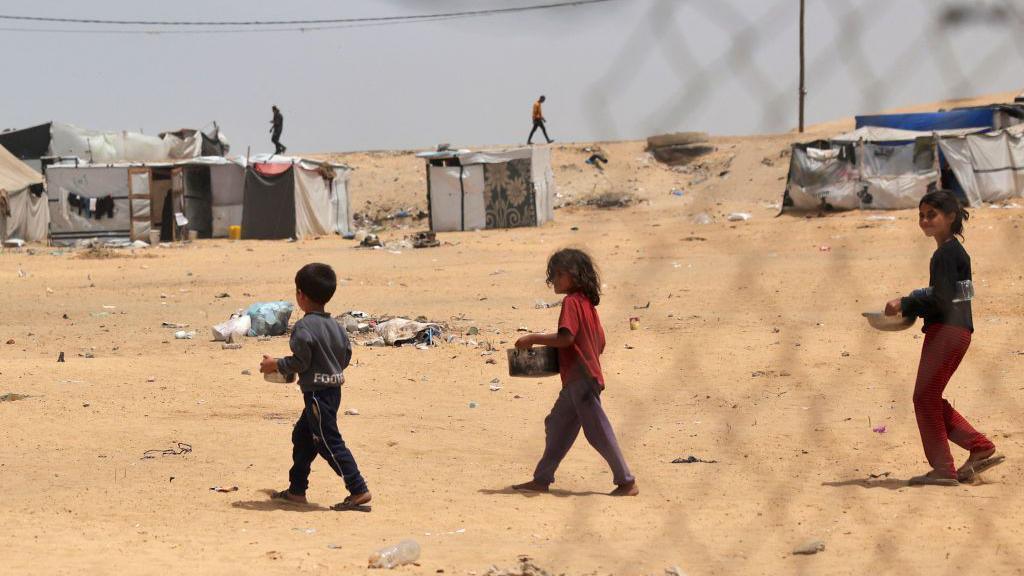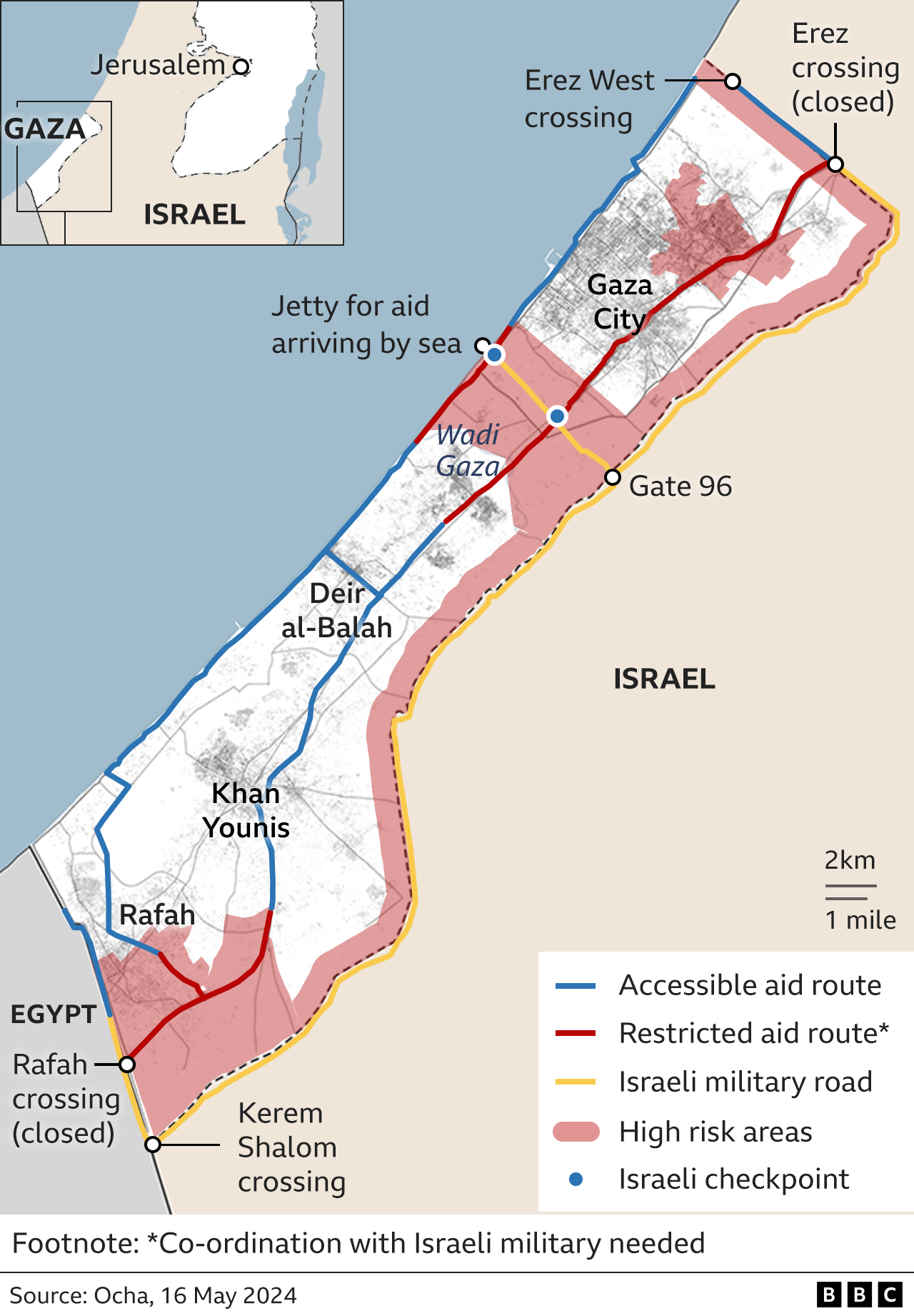UN halts Rafah food distribution due to shortages and hostilities

Unrwa said food warehouses and distribution centres in eastern Rafah were inaccessible because of the Israeli military operation
- Published
Food distribution in the southern Gaza city of Rafah has been suspended due to a lack of supplies and insecurity, the UN says.
The UN agency for Palestinian refugees, Unrwa, warned its distribution centre and a World Food Programme warehouse were now inaccessible because of the ongoing Israeli military operation against Hamas in eastern Rafah.
At least 815,000 of the more than a million people taking refuge in Rafah have fled since the Israeli operation began two weeks ago.
Unrwa also said its health centres had not received any medical supplies in the past 10 days.
The news came as the US said it did not believe any of the aid that had entered northern Gaza through a newly-completed floating pier had been distributed to Palestinians by humanitarian organisations.
On Saturday, crowds of Palestinians desperate for food intercepted a number of WFP lorries transporting aid from the pier, which prompted the agency to suspend deliveries until new routes could be identified.
Israel launched a military campaign to destroy Hamas in response to the group's cross-border attack on southern Israel on 7 October, during which about 1,200 people were killed and 252 others were taken hostage.
More than 35,640 people have been killed in Gaza since then, according to the territory's Hamas-run health ministry.
Three-quarters of Gaza marked as IDF evacuation zones, BBC finds
- Published20 May 2024
Can US floating pier improve Gaza’s critical aid pipeline?
- Published16 May 2024
After seven months of war in Gaza, Israel has insisted victory is impossible without taking Rafah and eliminating the last remaining Hamas battalions there.
But the UN and Western powers have warned that an all-out assault could lead to mass civilian casualties and a humanitarian catastrophe.
On 6 May, the Israel Defense Forces (IDF) ordered residents of eastern Rafah to evacuate for their own safety before it began what it called “precise operations” against Hamas operatives and infrastructure.
Since then, troops have advanced into central neighbourhoods and taken control of the Rafah border crossing with Egypt. The crossing remains closed, while the UN says the nearby Kerem Shalom crossing with Israel is too dangerous to access.
On Monday, Israel’s Defence Minister, Yoav Gallant, declared that it was “committed to broadening the ground operation in Rafah”.
Unrwa said in a report on Tuesday, external that it had been forced to suspend food distribution because the Israeli operation had left its distribution centre and a WFP warehouse inaccessible.
When asked about the ramifications, UN spokesperson Stephane Dujarric told reporters in New York: “People don’t eat.”
It is not clear how many people are still living in the Rafah area. But the head of Unwa implied it was more than 800,000 on Sunday, when he said that “nearly half of the population are on the road”.
The IDF has told them to head to an “expanded humanitarian area” that stretches from nearby al-Mawasi to the central town of Deir al-Balah and said they will find field hospitals, tents, food and other supplies.
However, the UN has said nowhere is safe in Gaza and that the designated area is already crammed with people and does not have clean drinking water supplies and sanitation facilities.
The IDF said on Tuesday that its soldiers were continuing “targeted raids on... terrorist infrastructure and buildings” in eastern Rafah, and that it had “eliminated dozens of terrorists” who tried to approach them.
Another statement said it was facilitating “the passage of hundreds of trucks containing food, water, medical supplies, and shelter equipment” across Gaza.
It reported that 381 aid lorries were transferred via Kerem Shalom on Tuesday and that another 70 entered northern Gaza via the Erez West crossing. But it also noted 650 lorry loads remained waiting for collection by aid agencies at the two crossings.
As well as saying that Kerem Shalom is difficult to access safely, the UN has noted that areas in the vicinity of Erez West are under other Israeli evacuation orders.

A UN-backed assessment published in March warned that 1.1 million people in Gaza were facing catastrophic levels of hunger and that famine was imminent by May in northern Gaza, where an estimated 300,000 people are trapped.
No formal famine declaration has been made, but WFP executive director Cindy McCain said earlier this month that “there is full-blown famine in the north, and it's moving its way south”.
On Friday, the first lorry loads of aid rolled off the US military’s floating pier south-west of Gaza City, which US officials have said will “surge humanitarian assistance”.
US Central Command announced early on Tuesday, external that 569 tonnes of aid had been delivered by cargo ships that sailed from Cyprus.
But later in the day, Pentagon Press Secretary Maj Gen Pat Ryder told reporters in Washington, external that none of those supplies had yet been distributed by humanitarian organisations.
Mr Dujarric said contractors were able on Friday to drive 10 aid lorries from the pier to a WFP warehouse in the central town of Deir al-Balah. But the next day 11 of the 16 lorries which set off were intercepted by hungry crowds.
"These trucks were traveling through areas where there'd been no aid,” Mr Dujarric said. “I think people feared that they would never see aid. They grabbed what they could.”
Gen Ryder said there had been discussions among the US, Israel and the UN "to identify alternative routes for the safe movement of staff and cargo”.
“We do anticipate that assistance will be distributed in the coming days, of course, conditions permitting,” he added.
Meanwhile, the head of the World Health Organization warned that the largest partially functional hospital in northern Gaza was reportedly hit four times on Tuesday, external, as battles rage between Israeli forces and Palestinian armed groups in the nearby Jabalia area.
The IDF said it was reviewing reports from medics at Kamal Adwan hospital in Beit Lahia that its emergency department had been struck by Israeli missiles, forcing them to rush patients on hospital beds to a street outside.
The WHO also said al-Awda hospital in Jabalia had been besieged since Sunday, with staff, patients and people accompanying them trapped inside.
Tens of thousands of civilians have fled Jabalia since 11 May, when the IDF said it would re-enter the area because Hamas had regrouped there.